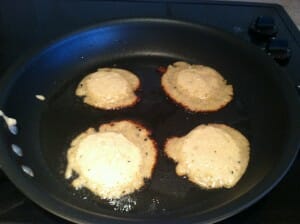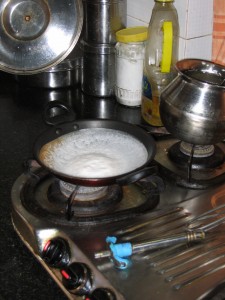
Traditional Hanukkah foods are either fried in oil or made with cheese. Throughout the centuries. Jews from different geographic regions created their own fried varieties. Eastern European Jews favor their latkes (potato pancakes while Jews from Mediterranean countries indulged on sufganiyot (jelly doughnuts). Until I read the cookbook, Spice & Kosher, I did not know what Indian Jews ate during Hanukkah. I learned that southern Indian Jews who lived in Cochin ate unniyappam or neyyappam (Hanukkah fritters).
These rice dumplings are traditionally cooked in a cast-iron pan called a appakkara. The pan has round indentations for the batter. According to Bala Menon it resembles the Danish pan called aebleskiver and the Greek Jewish pan called bimuelo. Since I do not own any of these pans, I simply fried the dough in a flat fry pan. As a result, the dumplings were a different size and shape. My version looked like pancakes with lacy edges whereas the pictures on the Internet looked like doughnut holes.

Royal Mist in Munnar
These lacy edged pancakes reminded me of the appam that I ate at the Royal Mist in Munnar. Those appams were made one at a time in a pan that had an indentation at the bottom and sloped sides. This can be a slow process if you are preparing appam for many people.
Whenever I try a recipe for a food that I’ve never eaten, I tread carefully as I ask myself several questions.
- Will the recipe be easy to follow?
- Will it be possible to improvise if I don’t have all of the ingredients or utensils?
- Will it be possible to modify fats and sugars or undesirable spices?
- Will my version turn out like the original version?
This morning, I tried the recipe for Hanukkah fritters in Spice & Kosher: Exotic Cuisine of the Cochins. On page 171, I found this recipe for Unniyppam or Neyyappam.
Ingredients:
2 cups basmati rice or idli rice
2 cups brown sugar
2 over ripe bananas
2 tbs black sesame seeds
1 tsp cardamon powder
4 tbsp dry coconut chopped into fine pieces
1 cup clarified butter
Oil for frying
Directions:
Wash and soak rice for about 5 hours. Grind soaked rice with water, brown sugar and mashed bananas. Transfer to a bowl and add cardamon powder, sesame seeds, and coconut pieces and mix well. The batter should have the consistency of idli (or pancake) batter. Keep this batter in fridge for 4-5 hours, allowing the ingredients to blend well. Heat appakkara and fill 3/4 of each depression with equal amounts of clarified butter and oil. Pour batter gently into the oil to fill half of the well and cook for 2 minutes. Turn the appams and cook for another 2 minutes. Use a skewer to check whether the appams are done (skewer will come out clean). Remove appams and drain on paper towel.
Comments:
I was intrigued with the idea of making my own rice flour by grinding the soaked rice with the brown sugar and bananas. I wonder whether it would be possible to simply substitute rice flour. I was thankful for my food processor. Grinding the rice by hand would have been a chore.
Time management is a necessity since this recipe requires 2 wait periods. I ended up refrigerating the batter overnight.
I frequently adjust the amounts of several ingredients to meet the needs of my family. In this recipe, I cut the amount of brown sugar in half, decreased the amount of cardamon powder, and eliminated the clarified butter. The fritters were sufficiently sweet with just a cup of brown sugar and the fat content was lessened without the butter. Cardamon has a distinct taste. My family prefers less rather than more.
If I make this recipe again, I will consider purchasing a pan with indentations. While the flat version was tasty, I would like to bite into a Hanukkah fritter and taste a softer banana inside.
Anyone who leaves a comment on this blog, my interview with Bala Menon, or Spice & Kosher Cookbook Review by December 8th will be eligible for a drawing for an autographed copy of Spice & Kosher.
Related Posts Links:
Q & A with Bala Menon, author of Spice and Kosher
Spice and Kosher Cookbook Review
A Visit to Munnar and Cochin, India
Sandra Bornstein is the author of MAY THIS BE THE BEST YEAR OF YOUR LIFE. It is available on Amazon.
Sandra’s memoir highlights her living and teaching adventure in Bangalore, India. She is a licensed Colorado teacher who has taught K-12 students in the United States and abroad as well as college level courses. Sandra is married and has four adult sons.
The memoir was a finalist in the Travel category for the 2013 Next Generation Indie Book Awards, the 2013 International Book Awards, the 2013 National Indie Book Excellence Awards, 2013 USA Best Book Awards, and a Honorable Mention award in the Multicultural Non-Fiction category for the 2013 Global ebook Awards.
my mother used to make us Neyyappam during Hanukkah. I thought about it before the Hanukkah went to buy at Indian store near by our house unfortunately the store did not carry the frozen Neyyappam from Kerala. thank you for sharing the recipe.
If you try the recipe, it would be great to hear your feedback. Best wishes for a joyous Hanukkah.